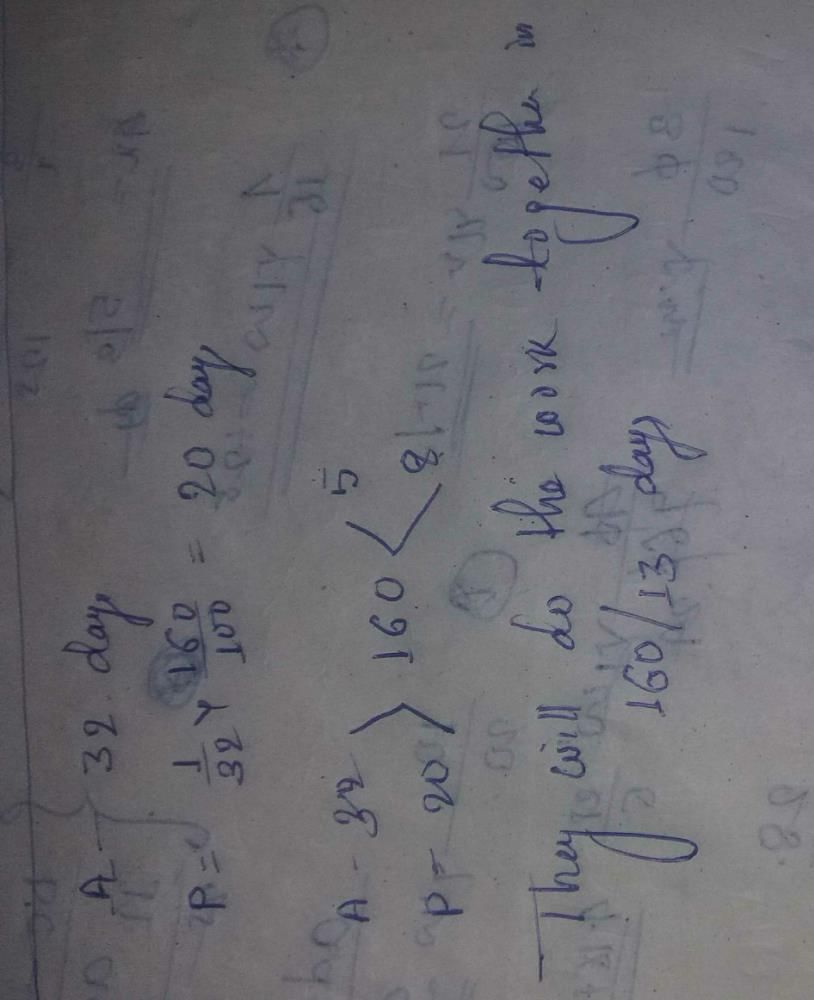Quant Exam > Quant Questions > A can do a work in 32 days. P who is 60 perce...
Start Learning for Free
A can do a work in 32 days. P who is 60 percent more efficient than A. Find how much time they will take together to do the same work?
- a)150/13 days
- b)160/13 days
- c)170/3 days
- d)190/3 days
- e)None of these
Correct answer is option 'B'. Can you explain this answer?
Verified Answer
A can do a work in 32 days. P who is 60 percent more efficient than A....
A’s one day work = 1/32 so P one day work = (160/100)*1/32 = 1/20, so P will take 20 days to complete the work.
So Both A and P will take = (32*20)/52 = 160/13 days
So Both A and P will take = (32*20)/52 = 160/13 days
Most Upvoted Answer
A can do a work in 32 days. P who is 60 percent more efficient than A....
Let's assume that A can complete the work in 32 days. This means that A's efficiency is 1/32 of the work per day.
Now, let's find out P's efficiency. It is given that P is 60% more efficient than A. To calculate P's efficiency, we add 60% of A's efficiency to A's efficiency.
60% of A's efficiency = (60/100) * (1/32) = 3/160
P's efficiency = A's efficiency + 60% of A's efficiency = (1/32) + (3/160) = 5/160
So, P's efficiency is 5/160 of the work per day.
Let's calculate how much time P will take to complete the work alone.
P's efficiency = 5/160 of the work per day
Therefore, P will complete the work in 160/5 = 32 days.
Now, let's find out how much time A and P will take together to complete the work.
Let's assume that they will take 'x' days to complete the work together.
In one day, A completes 1/32 of the work, and P completes 1/32 of the work.
So, in 'x' days, A will complete x/32 of the work, and P will complete x/32 of the work.
Together, A and P complete (x/32) + (x/32) = 2x/32 of the work in 'x' days.
But we know that they complete the entire work together, so:
2x/32 = 1
Multiplying both sides by 32:
2x = 32
Dividing both sides by 2:
x = 16
Therefore, A and P will take 16 days together to complete the work.
The correct answer is option B) 160/13 days.
Now, let's find out P's efficiency. It is given that P is 60% more efficient than A. To calculate P's efficiency, we add 60% of A's efficiency to A's efficiency.
60% of A's efficiency = (60/100) * (1/32) = 3/160
P's efficiency = A's efficiency + 60% of A's efficiency = (1/32) + (3/160) = 5/160
So, P's efficiency is 5/160 of the work per day.
Let's calculate how much time P will take to complete the work alone.
P's efficiency = 5/160 of the work per day
Therefore, P will complete the work in 160/5 = 32 days.
Now, let's find out how much time A and P will take together to complete the work.
Let's assume that they will take 'x' days to complete the work together.
In one day, A completes 1/32 of the work, and P completes 1/32 of the work.
So, in 'x' days, A will complete x/32 of the work, and P will complete x/32 of the work.
Together, A and P complete (x/32) + (x/32) = 2x/32 of the work in 'x' days.
But we know that they complete the entire work together, so:
2x/32 = 1
Multiplying both sides by 32:
2x = 32
Dividing both sides by 2:
x = 16
Therefore, A and P will take 16 days together to complete the work.
The correct answer is option B) 160/13 days.
Free Test
FREE
| Start Free Test |
Community Answer
A can do a work in 32 days. P who is 60 percent more efficient than A....


|
Explore Courses for Quant exam
|

|
Question Description
A can do a work in 32 days. P who is 60 percent more efficient than A. Find how much time they will take together to do the same work?a)150/13 daysb)160/13 daysc)170/3 daysd)190/3 dayse)None of theseCorrect answer is option 'B'. Can you explain this answer? for Quant 2025 is part of Quant preparation. The Question and answers have been prepared according to the Quant exam syllabus. Information about A can do a work in 32 days. P who is 60 percent more efficient than A. Find how much time they will take together to do the same work?a)150/13 daysb)160/13 daysc)170/3 daysd)190/3 dayse)None of theseCorrect answer is option 'B'. Can you explain this answer? covers all topics & solutions for Quant 2025 Exam. Find important definitions, questions, meanings, examples, exercises and tests below for A can do a work in 32 days. P who is 60 percent more efficient than A. Find how much time they will take together to do the same work?a)150/13 daysb)160/13 daysc)170/3 daysd)190/3 dayse)None of theseCorrect answer is option 'B'. Can you explain this answer?.
A can do a work in 32 days. P who is 60 percent more efficient than A. Find how much time they will take together to do the same work?a)150/13 daysb)160/13 daysc)170/3 daysd)190/3 dayse)None of theseCorrect answer is option 'B'. Can you explain this answer? for Quant 2025 is part of Quant preparation. The Question and answers have been prepared according to the Quant exam syllabus. Information about A can do a work in 32 days. P who is 60 percent more efficient than A. Find how much time they will take together to do the same work?a)150/13 daysb)160/13 daysc)170/3 daysd)190/3 dayse)None of theseCorrect answer is option 'B'. Can you explain this answer? covers all topics & solutions for Quant 2025 Exam. Find important definitions, questions, meanings, examples, exercises and tests below for A can do a work in 32 days. P who is 60 percent more efficient than A. Find how much time they will take together to do the same work?a)150/13 daysb)160/13 daysc)170/3 daysd)190/3 dayse)None of theseCorrect answer is option 'B'. Can you explain this answer?.
Solutions for A can do a work in 32 days. P who is 60 percent more efficient than A. Find how much time they will take together to do the same work?a)150/13 daysb)160/13 daysc)170/3 daysd)190/3 dayse)None of theseCorrect answer is option 'B'. Can you explain this answer? in English & in Hindi are available as part of our courses for Quant.
Download more important topics, notes, lectures and mock test series for Quant Exam by signing up for free.
Here you can find the meaning of A can do a work in 32 days. P who is 60 percent more efficient than A. Find how much time they will take together to do the same work?a)150/13 daysb)160/13 daysc)170/3 daysd)190/3 dayse)None of theseCorrect answer is option 'B'. Can you explain this answer? defined & explained in the simplest way possible. Besides giving the explanation of
A can do a work in 32 days. P who is 60 percent more efficient than A. Find how much time they will take together to do the same work?a)150/13 daysb)160/13 daysc)170/3 daysd)190/3 dayse)None of theseCorrect answer is option 'B'. Can you explain this answer?, a detailed solution for A can do a work in 32 days. P who is 60 percent more efficient than A. Find how much time they will take together to do the same work?a)150/13 daysb)160/13 daysc)170/3 daysd)190/3 dayse)None of theseCorrect answer is option 'B'. Can you explain this answer? has been provided alongside types of A can do a work in 32 days. P who is 60 percent more efficient than A. Find how much time they will take together to do the same work?a)150/13 daysb)160/13 daysc)170/3 daysd)190/3 dayse)None of theseCorrect answer is option 'B'. Can you explain this answer? theory, EduRev gives you an
ample number of questions to practice A can do a work in 32 days. P who is 60 percent more efficient than A. Find how much time they will take together to do the same work?a)150/13 daysb)160/13 daysc)170/3 daysd)190/3 dayse)None of theseCorrect answer is option 'B'. Can you explain this answer? tests, examples and also practice Quant tests.

|
Explore Courses for Quant exam
|

|
Signup for Free!
Signup to see your scores go up within 7 days! Learn & Practice with 1000+ FREE Notes, Videos & Tests.


















